
8 tips on how to become more socially responsible in the coffee sector
The coffee industry employs and supports millions of people all around the world. However, it still has a great deal of social issues. These include poverty among farmers, child labour, gender-based discrimination and poor working conditions. Consumers in Europe have become more aware of these issues. This means demand for more socially responsible practices in the coffee sector is growing.
Contents of this page
- Get to know the benefits of being socially responsible
- Be aware of standards that lead to negative practices in the sector
- Obtain certification
- Provide accurate data and make sure your product is traceable
- Build relationships with farmers to ensure you pay a fair price
- Promote sustainable sourcing practices
- Adhere to workers’ health and safety standards
- Strive to ensure gender equality at the farm or cooperative level
As a coffee exporter, it is important you promote social sustainability in your business. You need to understand the social issues that affect the coffee industry to do this. This report will give you an idea of how to work with farmers and local communities to address these problems. This will improve the sustainable supply of coffee for your business.
In this article, we give tips for coffee cooperatives and exporters that can help them become more socially responsible. We focus on practical strategies that you can use. With them, you can achieve a more sustainable and ethical coffee business. This will give you an advantage when entering the European market. It can make your business more competitive while also having a positive impact on farmers, your workers and your community.
1. Get to know the benefits of being socially responsible
Being socially responsible has a lot of benefits. Many exporters are unaware of the benefits of social responsibility. Getting to know the benefits of being socially responsible serves as a foundation for using the other tips in this report.
Increase employee loyalty
Increasing employee loyalty is key to long-term success. If you treat your employees well, they are more likely to be satisfied with their jobs. You can do this by offering fair wages and good working conditions. This satisfaction means increased productivity. In the long term, this means higher output and increased profits.
When your employees are loyal, they are less likely to leave and seek employment elsewhere. This can help you save money on recruitment and training costs. These can be very expensive. You can put effort into keeping your current staff by creating a positive work environment. This helps your employees grow their careers and develop.
In addition to cost savings, loyal and satisfied employees can also have benefits that you cannot simply buy. For example, a positive workplace culture, increased morale and a sense of community within the organisation.
Increase the loyalty of your buyers and customers
Nowadays, many European customers prefer to support businesses that share their values and beliefs. Studies show that 56% of consumers from the European Union (EU) pay attention to the impact of goods and services on sustainability. Two-thirds of consumers say they buy products produced in a sustainable way even if they cost more.
Being socially responsible, ethical and sustainable helps you attract and keep customers who value these principles.
Gain access to new markets
Retailers and distributors are also increasingly seeking suppliers that meet ethical and sustainability standards. Being socially responsible helps you access new markets that prioritise socially responsible practices. This helps you increase your customer base and potential revenue streams. By expanding your market, you can also be less dependent on just one market and so reduce your overall business risk. You can prove how socially sustainable you are by promoting your responsible practices and getting certificates. Fairtrade and the Rainforest Alliance are examples of good certifications.
Improve the reputation of your business
When you have ethical and sustainable practices, you will earn a good name and stakeholders will trust you more. This can have various benefits. Examples are positive media coverage and word-of-mouth referrals. It also increases brand awareness. A good name can attract potential partners and investors who have similar values and goals. This can lead to more business opportunities and grow your company. Lastly, it can help your business stand out from others in the market.
Build better relationships with suppliers, farmers and communities
Engaging in ethical and sustainable practices gives you the platform to build stronger relationships with farmers, suppliers and local communities. This leads to better working conditions and increased trust for cooperative workers.
2. Be aware of standards that lead to negative practices in the sector
You have to be aware of potential obstacles to become socially responsible. Some of these obstacles are cultural, social and economic standards. They can include:
- Traditional farming methods that may not be sustainable;
- Cultural practices that prioritise short-term gains over long-term sustainability;
- Economic pressure to make profits as high as possible at the expense of ethical and sustainable standards.
Some cultural norms include gender roles. These can, unfortunately, result in gender-based violence, child marriage, discrimination and other forms of social injustice. Gender roles are very strict in some cultures. Women may not have equal access to education, employment or other opportunities. This can make it difficult to promote gender equality and empower women in the coffee supply chain.
Poor labour conditions may also be the result of social and economic norms. In some regions, there may be a culture of seeing low wages, long hours and poor working conditions as acceptable. This can make it difficult to put fair labour practices in place. It can also be hard to provide safe and healthy working environments for coffee workers.
Corruption is also important to be aware of. In some regions, bribery and other forms of corruption may be prevalent. This makes it difficult to put fair trade practices in place and to ensure that workers and farmers are treated fairly.
There are two ways you can address social norms and cultural obstacles.
You can use community-based dialogues to promote changing social norms. Hold programmes in the community that involve things like storytelling, role-playing and group discussions. This can help people understand how social norms affect their lives and communities.
There are several important steps to starting a community-based dialogue:
- Find the problem or issue. Be clear about what the social norm, cultural problem or issue is that needs to be talked about;
- Find out who needs to be involved. It is important to know who should participate in the dialogue. This can include community members, leaders and people who care about it;
- Make a plan. The leaders of the dialogue should plan how the dialogue will go. They should decide on rules, activities and how to make sure everyone has a chance to talk;
- Have the dialogue. It can take place over more than one meeting. The leaders should make sure everyone has a chance to share their thoughts, and that the conversation is respectful;
- Check if it worked. After the dialogue, check if it had a positive impact. Ask people what they thought about the discussions and see if things have changed.
Another way that is cheaper and more sustainable is the ‘organised diffusion’ approach. This helps community-based programmes reach more people in a cost-effective way. Applying organised diffusion means you train people who are part of the community to become ‘change agents’ to help spread new ideas and ways of doing things to their friends and neighbours.
When you start, it is important to choose the right people to be change agents. These people should be liked and respected in the community. They should be willing to teach others new ideas. They can be trained in workshops to become good leaders and teach others. This method helps new ideas spread through the community further and faster.
Tips:
- Build good relationships with leaders in the community. This includes opinion leaders, chiefs, political leaders and more. Maintain a good reputation and take care that the community develops. This will help you discuss sensitive issues about their norms and obstacles regarding ethical rights and social responsibility. It is important to work with NGOs, the government and other stakeholders when you address these norms;
- Find the right people for organised diffusion. This can be tricky. Ask community members to point you to influential and persuasive people in the community. It is important to understand the community and use the right methods to find the right people.
3. Obtain certification
Coffee buyers in Europe care about certificates. They are willing to pay more for coffee that meets higher sustainability standards. Cooperatives and exporters that make sure their farmers follow certification standards can compete with other businesses.
Certification shows that you follow strict rules when you produce coffee. Certification schemes like Fairtrade and the Rainforest Alliance focus on more than environmental issues. They also focus on social issues, like fair labour practices. By getting certified, you show that your company cares about these issues.
Certification programmes offer guidance and support. This helps you find and fix sustainability problems in your supply chain. When you are certified, independent third-party organisations will do regular audits and inspections. They do this to make sure you meet ethical labour standards. It also ensures that the process is transparent and fair.
Certification also gives you access to new markets. For example, Kibinge Coffee Farmers’ Co-operative Society in Uganda talks about how they gained global exposure due to certification. According to their general manager, they now have contacts everywhere – both through networks in Uganda and the Fairtrade network. They became well known, and buyers from all over the world contact them directly.
You should be aware that certification is a costly and time-consuming process. Although it may increase coffee prices, it does not necessarily mean higher income. Ensure that the benefits outweigh the costs for your company and workers before pursuing it.
Tips:
- Read more about certification in our study on entering the European market for certified coffee;
- Learn more about the European market potential of certified coffee;
- Ensure that the premium price for certified products is not lost to intermediaries. Contacting certifiers directly is best if you need to be certified – do not go through middlemen or intermediaries;
- Read our tips to go green in the coffee sector for a summary of the main certification programmes and how to get certified.
4. Provide accurate data and make sure your product is traceable
Different communities and regions have different social sustainability issues. Coffee roasters want to help farmers overcome them. However, they need accurate information from cooperatives and exporters. Providing transparent and traceable data to coffee buyers and roasters helps them learn which social responsibility problems they can address. This can be information on where social sustainability requirements are met and where they fall short. This information helps them make decisions on how they can support you to improve social sustainability. Addressing social sustainability shortfalls also provides you with premium pricing opportunities.
This process helps you build trust and ensure quality. Transparency and traceability strengthen the relationship between farmers and buyers, foster collaboration and improve the economic viability and sustainability of coffee farming communities.
Ensure transparency by sharing data about sustainability problems with coffee trading houses. You should share your successes but also your struggles and failures. Be honest and tell them about the problems farmers face. Make a plan to fix the problems and estimate the kind of help you need.
Ensure traceability in your supply chains. Traceability is the ability to share information and follow the movement of a product through every part of its supply chain. This means all the stages of production, processing and distribution. Use traceability to track where your coffee comes from and where it goes. Record information about the coffee at different stages of production, including the farms where it was grown, the processing facilities where it was prepared, and the distributors.
Data collection and recording take place at three levels. These are the farm level, the processing level and the export level.
At the farm level, data must include addresses and GPS locations (map link, latitude and longitude coordinates, and elevation). It should also have the types of coffee beans produced, plantation details, and pay invoices.
At the wet and dry processing stage, the processor must record farm data, the processor’s name and location, and give a batch number. The data must also contain information on coffee bean grade, processing methods, stock-keeping unit and other transaction details.
When you export, records have to include purchase orders from your buyers, batch numbers, farm details, processing details, stock keeping unit and name, quantity (volume), date of shipping, country of origin, invoice numbers and packing list, phytosanitary certificate, ICO (International Coffee Organisation) certificate of origin and bill of loading.
Figure 1: Types of data to collect for traceability
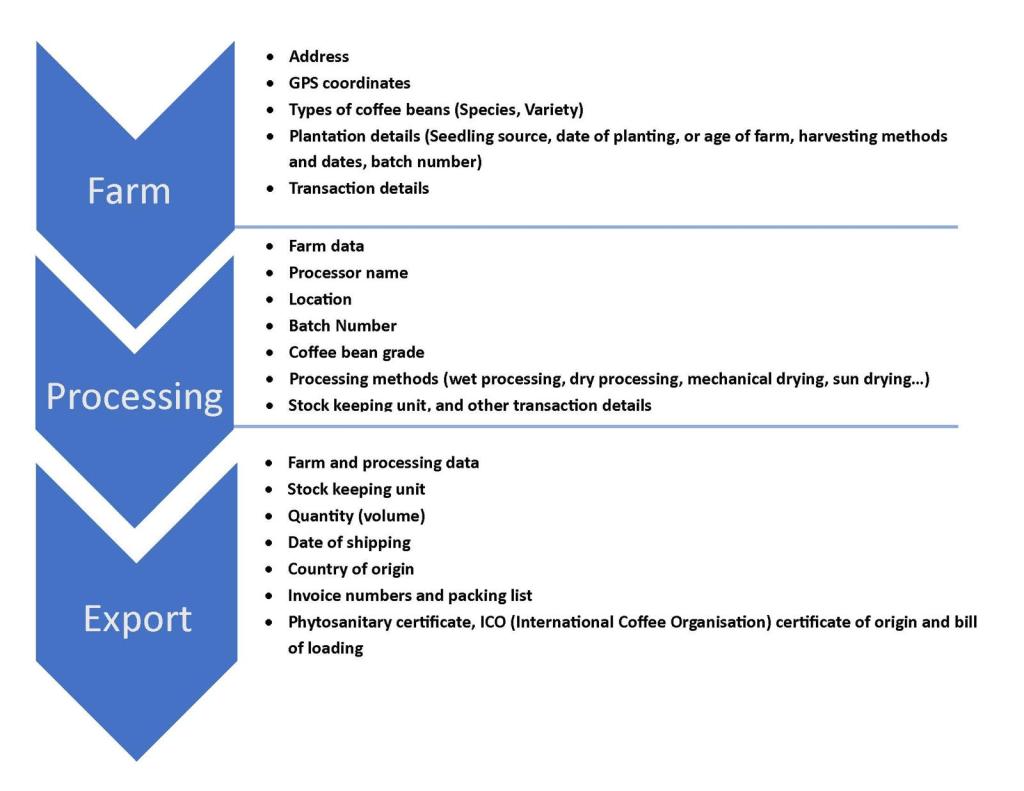
Source: Amonarmah Consults
When tracking your coffee, implement quality control measures to ensure that the coffee meets international standards for quality and safety. Also, conduct regular audits to ensure compliance with traceability standards and so you can identify areas for improvement. Lastly, use labelling and certification schemes to provide consumers with information on the origin and quality of the coffee. This can include third-party certification schemes like Fairtrade, Rainforest Alliance and Organic certification. This will help you to be accountable for your coffee and will increase your buyers’ trust.
Tips:
- Collect information. Gather data about the coffee from farmers, processors and other stakeholders in the supply chain. This can be done using a barcode or a QR code. Learn about how to use QR codes for coffee farms. It is important for cooperatives to adopt digital technology for traceability because of the EU regulation on deforestation-free products;
- Record data. Record the coffee’s journey from farm to market. This includes information about the quality, quantity and location of the coffee at each stage;
- Store data. Store the data in a database that can be accessed by your buyers and customers;
- Share data. Share the data with buyers and consumers who want to know more about your coffee;
- Read about how EU regulations boost digitalisation in the coffee sector;
- Read our tips to go digital in the coffee sector for tools that can help you gather and record data.
5. Build relationships with farmers to ensure you pay a fair price
Many coffee farmers struggle to earn a living income even though world coffee prices keep rising. This is because large coffee buyers and intermediaries pay low prices. Farmers spend a lot of their money hiring labour to help them with their farm activities. Labour alone is responsible for 60% of the total cost of coffee production. When coffee prices are low, it becomes difficult to hire extra labour to help with farm work. Low prices can lead to low incomes, poverty, malnutrition and child labour among farming households.
While smallholder farmers are responsible for most of the world’s coffee production, a small but significant proportion is produced by large coffee plantations that employ farm workers. Many coffee farm workers receive wages lower than the average wage in the agricultural sector, and they work long hours. Many are hired as casual labourers, on a per-day or per-task basis. This means their work time does not cover a full month of labour. Many are also hired for harvesting and paid based on the number of kilograms they harvest per day.
This problem persists because many exporters do not build relationships with coffee farmers beyond the business of buying their coffee. This hinders their ability to fully understand farmers’ daily struggles. And while cooperatives often do build some form of relationship with farmers, they can be more intentional in making it part of their agenda.
Exporters can build this relationship by working together with cooperatives. Long-term partnerships based on trust and respect help when agreeing on fair prices and promoting fair labour practices. To keep long-term relationships, it is important to create communication channels. This can involve talking to each other regularly on the phone.
Another step to enhance your relationship is to visit farms to understand the local context in which they produce coffee. This will help you to identify areas where farmers need help. While coffee companies make a lot of money, coffee farmers do not get a fair share. Coffee farmers receive only 2% of the revenue from every cup of coffee sold (see Figure 2). A strong relationship with farmers will facilitate agreeing on fair prices. This price will account for the true cost of sustainable production. It will also encourage them to invest in sustainable practices by ensuring fair labour practices while earning a decent living income. This will contribute to the long-term viability of their farms.
Ensure that farmers are represented in decision-making processes in the cooperative. Make sure farmers feel free to talk about production and social problems. By including farmers in leadership positions and committees, their voices can be heard, and social issues can be addressed together. This will also help you to discuss adopting sustainable practices. They will also understand the cost that comes with this and the reason for the prices they receive.
Figure 2: Coffee value chain actors and their share of coffee revenue
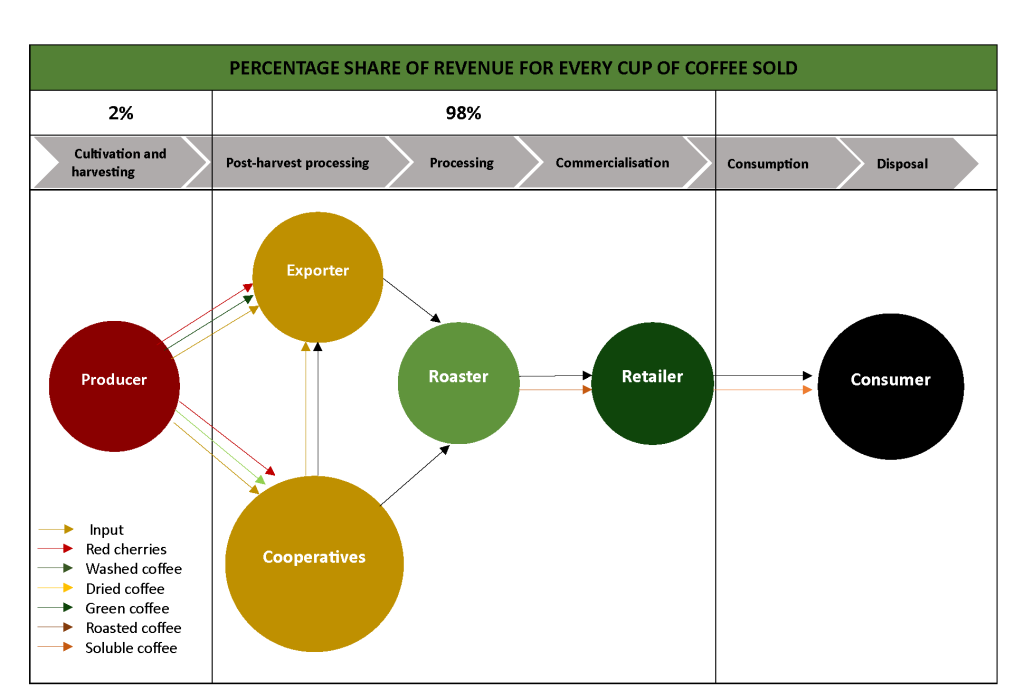
Source: Modified from the International Coffee Organisation (2021), Coffee Development Report 2020, The Value of Coffee: Sustainability, Inclusiveness, and Resilience of the Coffee Global Value Chain, ICO: UK.
Tips:
- Be transparent about your pricing policies and the factors that influence your pricing decisions. This can help farmers understand the value of their coffee and the price they should expect to receive. Cooperatives can also share information about market trends and the demand for coffee. This can help farmers make decisions about their farming practices;
- Work with farmers to improve the quality of their coffee and increase their yields. This can involve providing training and technical assistance, sharing best practices and investing in equipment and infrastructure. By working together, cooperatives and farmers can increase the value of the coffee they produce and ensure that farmers receive a fair price for their hard work.
6. Promote sustainable sourcing practices
Sustainable sourcing is the practice of buying goods from suppliers who use best practices. By sourcing responsibly, you help ensure that coffee is produced in a way that supports the livelihoods of everyone in the supply chain. This helps to maintain the quality of the coffee and the long-term existence of the coffee industry.
You can do this by developing and using a Code of Conduct that states what you expect of ethical labour practices. It should cover issues like wages, working hours, health and safety. Communicate about it with all your suppliers. You can ensure it is enforced with regular audits and inspections. Next, provide training and education to suppliers and cooperatives. This training should help them understand and follow ethical labour standards. This can include training on topics like health and safety, and the importance of fair treatment.
Ensure there is no forced or child labour in your supply chain
Children are often used to replace labourers when coffee prices are low and farmers can no longer pay for help on their farms. They work with their parents to supplement their family’s income. In areas where there are coffee plantations, they help parents meet their production quotas.
In December 2024, the EU adopted a regulation prohibiting products made with forced labour on the EU market. It defines forced labour based on the International Labour Organisation’s (ILO) Convention on Forced Labour 1930 (No. 29). The International Labour Organisation (ILO) defines child labour as work that deprives children of their childhood, potential and dignity and is harmful to their physical and mental development. This includes all work or service extracted under the menace of penalty without voluntary consent and forced child labour.
From December 2027, there will be a ban on any product made using forced labour at any stage of the supply chain, whether the forced labour occurred in the EU or in a non-EU country that supplies coffee to the EU. Coffee products found to involve forced labour will be banned from the EU market, withdrawn from sale and disposed of (recycled or destroyed). This regulation applies to all companies operating in the EU, regardless of their size, revenue or country of incorporation, including those selling coffee products online or via distance selling.
Coffee production is often associated with labour risks, including child labour, low wages and poor working conditions. This increases the likelihood of scrutiny under the forced labour regulation. If they are to comply with the regulation, it is important that coffee buyers (importers, roasters and retailers) ensure that their supply chains are free from forced labour. Proof will be required that coffee is produced without forced labour.
It is important for coffee cooperatives and exporters to identify areas of vulnerability related to forced and child labour in your supply chain. Assess the communities where coffee suppliers are located, the type of work they do and the working conditions. This will help you understand where the risks are highest.
Once you have identified the high-risk areas, you should create a Supplier Code of Conduct. This Code of Conduct should state what you expect from your suppliers about forced and child labour. It should require your suppliers to follow all relevant laws and regulations. The code should also set specific requirements for working conditions, fair wages and other labour-related issues.
Make sure that no one is forced to work and that no children are being made to work in your supply chain. You need to teach your suppliers and cooperatives how to identify and prevent these problems. You can train them on labour laws, human rights and ethical business practices.
After implementing the Code of Conduct, you should also set up a grievance mechanism. This is a way for people to report any problems they come across. It could be a private way for workers to report problems, so they do not have to worry about being punished. By doing all of these things, you can ensure that your supply chain is safe and that everyone is treated fairly.
Finally, your Supplier Code of Conduct should also include a system for monitoring. Check that your suppliers are complying with the code. This could involve regular audits or inspections. You should also set clear consequences for suppliers who do not follow the code. You can end your business relationship with them.
Figure 3: Steps to ensure there is no forced or child labour
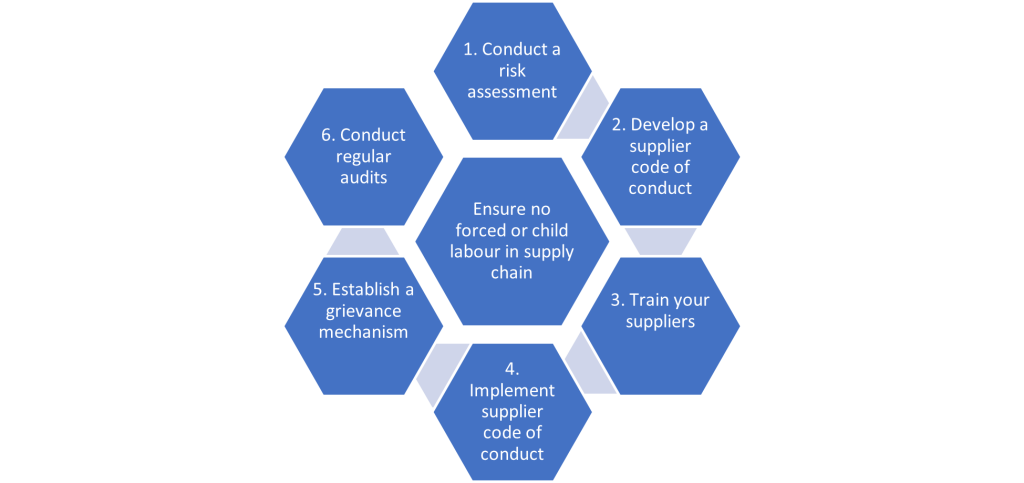
Source: Amonarmah Consults
When forced labour is suspected outside the EU, the European Commission will lead the investigations. However, member state authorities will investigate cases within their jurisdictions. Authorities will prioritise cases based on the scale, severity and likelihood of forced labour in supply chains. Companies under investigation must provide evidence within set time limits (for example 30 working days) to prove that their products are not linked to forced labour.
It is important to note that the forced labour regulation complements EU regulations such as the Corporate Sustainability Due Diligence Directive (CSDDD) and the Corporate Sustainability Reporting Directive (CSRD). These emphasise human rights and environmental due diligence in supply chains. See details on CSDDD in the next subsection. Also read ‘Tips to go green in the coffee sector’ to learn more about CSRD. Aligning with these standards will enhance your cooperative’s reputation and position as a leader in sustainable coffee production.
It is important to be aware that from as early as 2025, the EU has been working on a proposal for an ‘Omnibus Package’. This means that the EU wants to combine the CSDDD, CSRD and the EU taxonomy into one regulation. The EU taxonomy is a classification system that helps people make sustainable investment decisions. The EU wants to make it simpler for companies to comply and wants to reduce the administrative burden. There are concerns that this could lead to renegotiations on the text and postponed timelines. Many stakeholders are calling on the EU to uphold the current directives and timelines. Further discussions are due to take place. Therefore, while you ensure that you follow these regulations, also monitor the EU website on the CSDDD for the latest developments.
Comply with the Corporate Sustainability Due Diligence Directive (CSDDD)
In April 2024, the European Parliament adopted the Corporate Sustainability Due Diligence Directive (CSDDD), a key regulation to hold companies accountable for their impact on human rights and the environment in their global operations. It came into force officially in July 2024. The CSDDD is part of the EU’s wider agenda to encourage sustainable and responsible business practices, aligning with the European Green Deal and UN Sustainable Development Goals.
This Directive applies to some companies operating within the EU market, regardless of where they are based, ensuring that all businesses follow consistent sustainability standards. The Directive applies to:
1. Large EU-based limited liability companies and partnerships with more than 1,000 employees and annual turnover exceeding €450 million (net) worldwide.
2. Large non-EU companies based outside the EU but operating within the EU market with annual turnover exceeding €450 million (net) in the EU.
Small and medium-sized enterprises (SMEs) are not included in the proposed rules. However, the Directive offers support and protection for SMEs that may be indirectly affected as partners in supply chains. The CSDDD will be phased in over a longer period. This means that:
- Companies with 5,000 employees and €1,500 million turnover will have to be fully compliant by 2027. Companies with 3,000 employees and €900 million turnover will have to be fully compliant by 2028. Companies with 1,000 employees and €450 million turnover will have to be fully compliant by 2029;
- EU member states must incorporate the Directive into their national laws and communicate the relevant texts to the Commission by 26 July 2026. They will adapt the Directive to local contexts while ensuring EU-wide consistency;
- Companies are required to introduce processes to identify, reduce and report negative impacts on human rights and the environment within their operations and supply chains. They must adopt robust systems to prevent or mitigate negative effects across their supply chains, extending responsibility beyond their direct operations.
To demonstrate compliance with CSDDD, coffee cooperatives and businesses exporting to the EU will need to establish detailed Codes of Conduct addressing:
- Ethics: ensuring fair and transparent business practices;
- Social responsibility: treating workers and farmers fairly, providing living incomes and safeguarding communities;
- Environmental responsibility: tackling deforestation, preserving biodiversity and working towards achieving carbon neutrality.
Tips:
- Write your own Code of Conduct. The Global Code of Conduct for Coffee Suppliers is a good starting point. See the UNDP Sample Code of Conduct for Small and Medium Enterprises for more inspiration;
- Refer to ILO’s Checkpoints for Companies on Eliminating and Preventing Child Labour and download the app on your iOS or Android device to help you practice and promote decent work and social protection.
Engage in community development projects
It is important to support the communities where you work. Support projects like building schools or health clinics and local businesses to build good relationships with the community.
A cooperative in Rwanda called Kopakama set up washing stations in a farming community without electricity. Because of the washing stations, the community now has access to electricity. By doing things like this, you can ensure that your coffee business is fairer and more sustainable. You will develop a good relationship with the people who produce your coffee and customers in Europe who buy them.
Figure 4: Electrical line provided by Kopakama for the coffee farming community
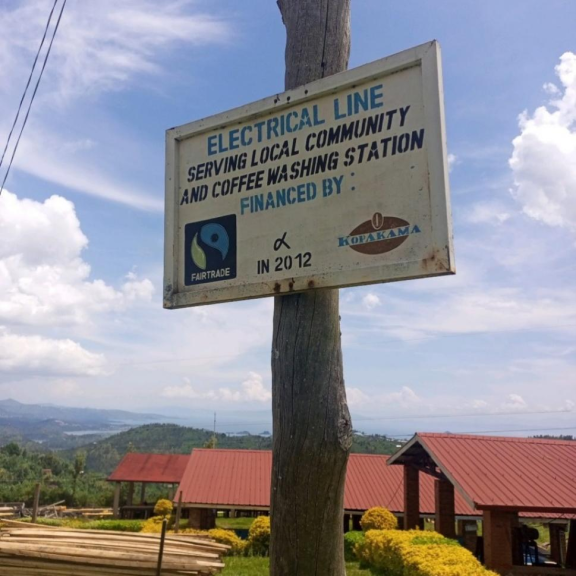
Source: Grace Izerwe (Kopakama Cooperative Rwanda)
Tips:
- Ensure that community development activities do not distract your core business;
- Ensure that community development projects reflect the needs of the community. You can identify community needs by attending community meetings and interviewing community and opinion leaders. You can also conduct a needs assessment through surveys or focus group discussions;
- Read more about the needs assessment process.
7. Adhere to workers’ health and safety standards
There are many health risks associated with working in coffee production, harvesting and processing. Workers can get hurt by sharp tools or by doing the same movements repeatedly. They may also have to carry heavy things, breathe in dust from the coffee or work in hot conditions. Coffee processing involves a lot of physical work, including removing the outer layer of the coffee, fermenting it, washing, drying, milling and sorting it.
Table 1: Work-related health risks for coffee farmers
| ILO’s list of work-related health risks for coffee production and primary processing |
|---|
| Injuries from sharp cutting tools – these can range from bruises to deep cuts; |
| Injuries from contact with or entanglement in unguarded machinery or from being hit by motorised vehicles; |
| Hearing loss or impairment due to noisy machinery; |
| Injuries from repetitive and forceful movements and lifting and carrying heavy or awkward loads; |
| Poisoning and long-term health problems from pesticide use or exposure; |
| Respiratory problems due to exposure to coffee dust; |
| High levels of sun exposure, which can result in skin cancer and heat exhaustion; |
| Snake and insect bites; |
| Long working hours or stress. |
Source: International Labour Organisation
Two tasks stand out as being particularly dangerous. The first is applying pesticide. This is often done without sufficient personal protective equipment. The second is shade management. This requires workers to climb trees with saws to remove branches.
Workers are not provided with personal protective equipment (PPE) in many coffee plantations. They experience changing temperatures, chemicals and ergonomic risk-related factors. They are also not usually given boots, gloves, hats, aprons, raincoats, spraying or lifting equipment, among many other things.
There is a lack of sanitation services and access to clean water, restrooms and public showers. Workers are not able to clean themselves after applying agrochemicals. This situation is worse when there are no medical services or access to healthcare facilities close by.
However, there are many benefits to protecting workers and ensuring their safety. When workers are safe, it protects the business in the long term. Ensuring workers’ health and safety is required by international labour laws. Not doing it can cause problems and damage your company’s reputation.
There are many things you can do to ensure workers’ safety. At the farmer and farm worker level, you can partner with your customers to buy PPE for farmers and workers at processing stations. Some buyers are willing to help farmers access healthcare. For example, some buyers of the coffee supplied by Kopakama Cooperative pay monthly health insurance for its farmers.
At the office level, to keep workers safe and healthy, coffee cooperatives, plantation managers and exporters must follow safety rules. Besides providing PPE, you can do the following:
- Train workers in the proper handling and storage of hazardous materials to minimise the risk of exposure;
- Train workers to safely operate machinery and equipment to prevent accidents and injuries;
- Train workers on proper body mechanics and ergonomics to prevent injuries related to repetitive motions and lifting;
- Train workers on electrical safety and the proper use of electrical equipment;
- Fire safety procedures should be in place, including fire extinguishers and evacuation plans;
- First aid kits and trained personnel should be available to assist in case of an injury or illness.
Tip:
- Read ILO’s Toolkit for Action to learn more about improving occupational safety and health in your coffee supply chain.
Provide a safe working space for workers
Providing a safe office space and environment for workers is a crucial duty of your coffee export company or cooperative. Here are some tips to help you provide a good office space and environment for your workers.
First, make sure the office space and environment is safe and clean. This means that the building is sturdy and has enough light and air. It should also be free of things like mould, pests and other hazards. The building should have basic facilities, like bathrooms and kitchens, that meet hygiene standards. Keep the office space and environment clean by making a cleaning schedule and sticking to it.
Provide basic amenities, such as clean water. Make sure that workers know their rights and responsibilities, including information about safety and hygiene. Inspect the office space and environment regularly to ensure that it is up to standard.
Provide security measures to keep workers, official documents and their belongings safe. This may include locks, security cameras or guards. Ensure workers have access to emergency services in case of accidents or illnesses. Provide information about hospitals, clinics and ambulance services.
By following these tips, you can make sure that workers have a safe and comfortable place to work. This can help them feel more satisfied with their job and be more productive.
Tip:
- Read guidelines provided by organisations like the International Labour Organisation (ILO) and the United Nations Human Rights Council (UNHRC). These guidelines emphasise the importance of providing safe and adequate office buildings for workers.
Ensure awareness of labour law and employment contracts within your organisation
Make a clear policy that explains labour laws and provides employment contracts for workers in your company. Tell all your employees about the policy and make it easy to understand. The contract should be clear about what the worker has to do, how much they will be paid and what benefits they will get. You should give the contract to the worker before they start working and let them know if there are any changes.
Teach your employees about labour laws and employment contracts. This will help them learn about their rights and what they need to do. You can teach them in a group, online or one-on-one. Make sure your employees have a way to report problems or concerns if they have any. You can do this by having an HR department or a hotline.
Check your policies and procedures often to make sure you are following the law and treating your employees fairly. If you have any questions, you can ask a lawyer or labour organisation. Listen to your employees and ask them for feedback on how things are going.
By doing these things, you can help your employees understand their rights and ensure you are following the rules.
Tips:
- Read more about the European Union’s labour law. It mostly concerns workers in the EU. However, being familiar with the minimum standards in the EU will give you an idea of what importers consider to be good working conditions;
- Read ILO’s report on wages and working conditions in the coffee sector;
- Follow this guide to writing an employment contract.
Protect workers’ rights and freedom of association
Workers in cooperatives, exporting companies and coffee plantations should know their rights and have the ability to join unions or workers’ organisations if they want.
Allow workers to join a union or workers’ organisation. Do not treat them differently if they do. Set up ways for workers and management to talk, like meetings or a suggestion box, so everyone can share concerns and ideas. This can help build trust and respect.
Make sure you follow the laws that protect workers’ rights to join unions or workers’ organisations. Do not interfere with them.
When workers join unions or workers’ organisations, your company can get benefits like:
- Fewer problems at work, like complaints or strikes;
- A happier, healthier and more skilled workforce;
- More workers who care about the business and work hard;
- A safer workplace;
- Workers who want to stay.
Tips:
- Read ILO’s guide on freedom of association and collective bargaining;
- Enhance workers’ rights and freedom of association. This will provide a safe workplace and job satisfaction for workers, as well as stability and sustainable growth for the cooperative business.
8. Strive to ensure gender equality at the farm or cooperative level
Gender inequality is common in the coffee sector, with women often being underrepresented in the coffee industry and having fewer opportunities to own land, access credit or participate in decision-making processes. Meanwhile, they provide up to 70% of labour in coffee production. Women coffee farmers produce fewer crops than male farmers because they lack input. If we reduce the gender gap, we could create up to 30 billion more cups of coffee a year.
Gender issues can be addressed at two levels. At the farm level and at the cooperative or company level.
At the farm level, you should promote gender equity in two ways. First, it is important to educate male farmers about the importance of gender equality. Second, empower female farmers and the wives of male farmers who do most of the work on the farm.
An example to follow for empowering women is that of Kopakama Cooperative in western Rwanda. They established a sub-cooperative called ‘Ejo Heza’ for its female members. The cooperative provided a plot of land for the women to manage and grow their own coffee trees. The women come together twice a week to work on the communal plot. They spend the rest of the week working on their own family coffee farms. This has helped to empower women and give them a greater sense of ownership of their work. It has also led to the development of a speciality Arabica brand. This has attracted a new segment of the coffee market interested in supporting women in agriculture.
Another example is Ketiara Cooperative in Indonesia. About 40% of its members are women and the cooperative is also led by a woman. Under her leadership, the cooperative has successfully introduced a unique coffee range named ‘Queen Ketiara’, which is exclusively produced by women. This specific coffee line has emerged as one of the cooperative’s most valuable assets. The cooperative has not only improved the livelihoods of nearly 2,000 Gayonese farmers, but it has also conveyed an important message to the community: empowering women leads to good outcomes.
Creating a sub-cooperative for female members and empowering them to work on their own plots promotes economic empowerment for women farmers. This, in turn, improves social welfare in rural communities.
Figure 5: Women coffee farmers in Rwanda
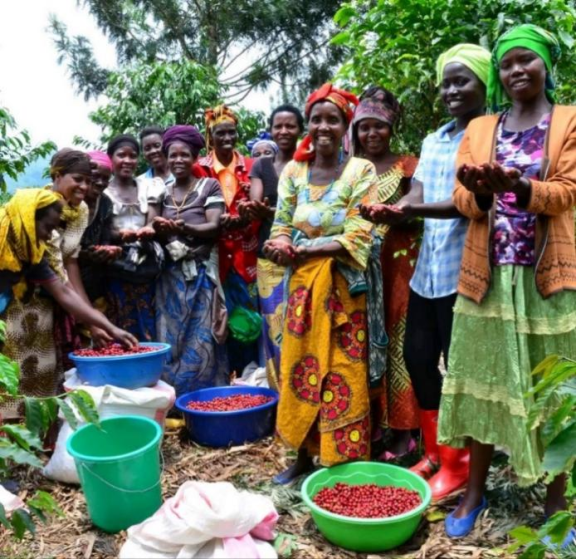
Source: Grace Izerwe (Kopakama Cooperative Rwanda)
Create a platform to bring women into the coffee farming community. The platform can act as a forum for women. In it, they can discuss their challenges in coffee farming and share solutions. It can also provide a space for women to network, access training and extension services, and receive support from one another.
To create the platform, you can start by identifying women leaders in the coffee farming community who can help mobilise and organise other women. These leaders can help organise meetings and discussions and serve as mentors.
The platform can take many forms, such as a women’s group, a WhatsApp or Facebook group, or a community-based organisation. The key is ensuring the platform is accessible to all women in the community. It should be a safe and supportive space for women to engage with one another.
It is important to ensure that your workplace is gender-sensitive. This means taking steps to ensure that women and men are treated equally. A gender-balanced workplace can lead to increased productivity, profitability, employee attraction and retention. It can also enhance creativity, innovation and openness.
Source: ILO
To promote gender balance in the workplace, you can look at your policies and practices to see if they are fair and attractive to women. For example, you can review your recruitment and promotion practices. Ensure they are fair and transparent and that they do not disadvantage women. When you offer training and development programmes, make sure they are equally accessible to all employees, regardless of gender. Check whether men are more likely to take up training than women. If this is the case, try to find out what is keeping women from participating in training.
Finally, it is important to measure progress and hold yourself accountable for promoting gender equality in your workplace and in the coffee farming community. This can involve tracking key performance indicators like the number of women in leadership positions or the share of female employees participating in training programmes.
Figure 7: Gender-balanced workplace
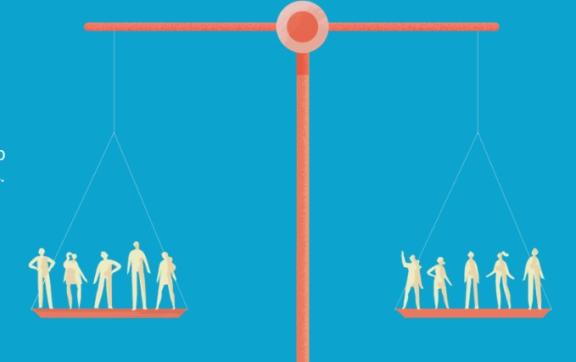
Source: ILO
Tips:
- Read the International Labour Organisation (ILO) guide on promoting gender equality in the workplace;
- Learn about the EU’s Gender Equality Strategy 2020–2025. Use this to keep up to date with gender equality issues in the EU, and strategies to address them. As an exporter to the EU, being up to date can help you implement strategies that will give you a competitive advantage;
- Reach out to the International Women’s Coffee Alliance for potential partnerships for gender equity. Take a look at the website for the chapter in your country.
Molgo Research carried out this study in partnership with Amonarmah Consults and Ethos Agriculture on behalf of CBI.
Please review our market information disclaimer.
Search
Enter search terms to find market research
